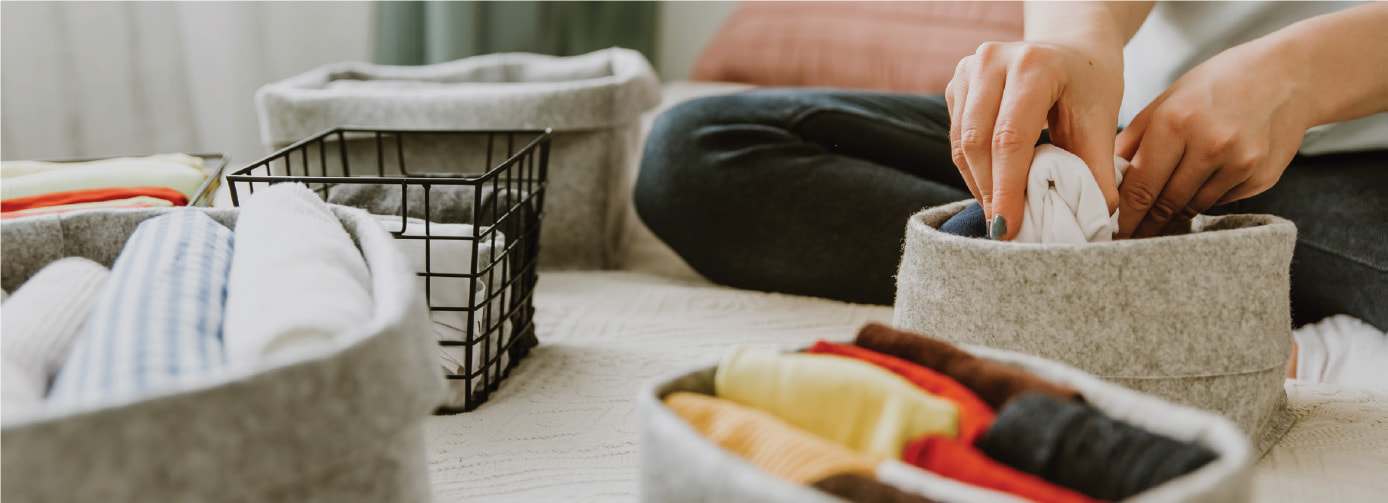|
A few months ago, we welcomed Su-Yoon Ko to our campus virtually to host a community presentation on decluttering and bereavement organizing. Su-Yoon is a professional organizer and passionate about supporting clients in the physical and emotional process of looking at their things and determining what to keep.
Her calm, kind approach is both supportive and reassuring during what we all know can be a very difficult process. After her presentation, we asked Su-Yoon for a few good tips that someone trying to embark on a decluttering/organizing journey could hold close as they begin the process. Here are her words of wisdom... Decluttering. Where to Start? by: Su-Yoon Ko, Decluttering Key declutteringkey.com Decluttering is more than just about dealing with the physical stuff, it’s emotional, mental, and spiritual as well, not to mention if there’s the added layer of grief when you’re seeing to someone’s belongings who has died. There’s no rule that you have to keep anything at all, or that you have to let anything go- it’s about finding what works best for you. Here are a few tips. Journaling One way to start, before you even touch anything, is to journal. Spend some time thinking about the person you lost and free write, without judgement. What words or phrases would you use to describe them and your relationship with each other? What memories come up? Are there certain things that make you think of that person when you see them? Are these energetically uplifting for you? Relationships are complicated, and it’s not that we’re trying to deny anyone’s complexities, but it also doesn’t serve anyone to keep things that have a negative memory attached. If you start with an idea of what items help define that person to you, perhaps it’ll make it easier to let go of the items that don’t have that same energy of memory for you. Set the boundaries Taking your unique situation into consideration, what do you truly have space for? If you have a boundary set in place before you get into the actual physical items, it might be easier to make decisions. What feels right to you: keep whatever fits in this closet? On this shelf? Or in this box? There’s no right or wrong, just what’s right or wrong for you. Setting boundaries will help give you clarity as you move through items. Will there be exceptions? Certainly; being flexible enough to consider those on a case by case basis can bring some peace. Pre-Sort Here’s a familiar scenario: you start sorting books, then you see a shoe and think “I’ll just put it in the closet”, you open the closet and start arranging clothes and suddenly you think “Wait what was I doing?” It’s easy to get distracted and never quite finish the task you started. One thing to do, you or someone who wants to help, is to pre-sort. This means putting all similar items together (“like with like” as professional organizers say), for example all paperwork together, books with books, etc. I feel that putting like with like from the whole house in one place works best; if that’s not be possible, then pre-sort room by room. After pre-sorting, it’s easier for the decision maker to then sort into keep, donate, sell etc. piles without distracting items. Intentionally saved vs. not decluttered When seeing to someone else’s belongings after they die, it can be difficult to let anything go, especially in the midst of grief. Reframing your perspective that many of the items there were perhaps not intentionally saved, rather they just had not yet been dealt with - sorted and taken to donation, trash or in general decluttered in some way, could be helpful. Trust that you’ll be able to discern what is truly a treasure and worth your time and effort to deal thoughtfully with, and what is not. Q & A with the Deceased Not that you need permission to let go of things that don’t fit your life, a suggestion if you do seek that extra support, is directly asking the deceased. Connect with them energetically and ask - aloud or in your mind – (“Grandma, is it ok if I let this afghan go?”, “Dad, would it be ok if I gave this book away?”), and then just listen for any thoughts or feelings that come to you. Quite often people hear in their mind an answer. This has been immensely helpful for some clients, and not so much for others. It’s just another tool in your toolbelt that you can pull out and use if the situation feels right. Need help getting started with your decluttering project? Contact Su-Yoon directly to learn more about her services at: declutteringkey.com/contact Martin Luther Care Center is part of the Ebenezer family of Senior Care Communities. We provide transitional care, long term care, assisted living apartments, and memory care for seniors in Bloomington, Minnesota. We also have adult day programs for seniors living at home. We’re located at 1401 East 100th St., in Bloomington, MN. Are you or a loved one interested in learning more about assisted living care? Call Amy at 952-885-8882 or more information and to schedule a tour today.
1 Comment
|
Director of Community Relations
Hello friends, my name is Kate and I'd love to share with you ALL of the wonderful things happening at Martin Luther Campus. Be sure to check our Blog, Lifestyle page and Facebook page often to stay updated on the happenings at our community! Archives
November 2023
Categories |
|
telephone |
|
DIRECTIONSimap
|
© 2021 Fairview Health Services
|


 RSS Feed
RSS Feed

